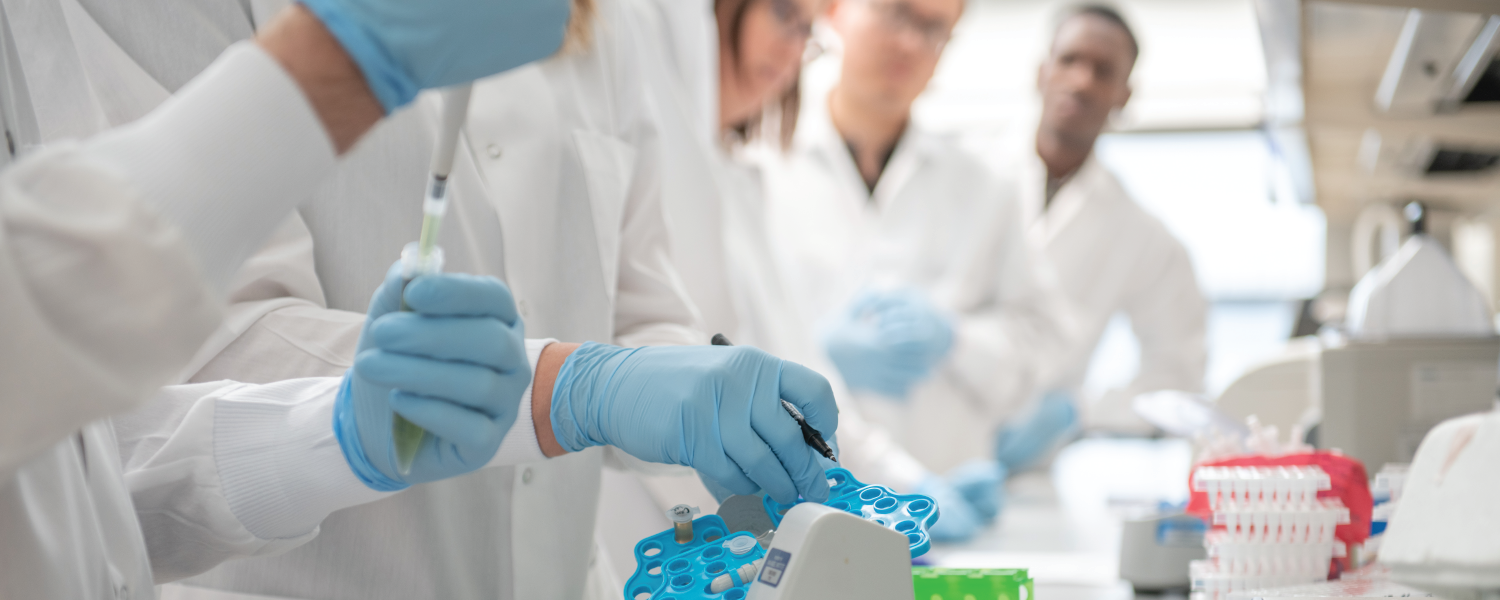Metabolism fuels our day to day lives, from ensuring we have enough energy to function to keeping our immune systems up and running.
That’s why, in 2018, Van Andel Institute established its Department of Metabolism and Nutritional Programming, which brought together a team of expert scientists to explore the countless ways metabolism impacts health and disease.
Their goal is ambitious — to make discoveries that can be transformed into scientifically sound strategies for improving wellbeing, treating metabolic diseases and augmenting existing treatments for cancer and other disorders.
In honor of the department’s fifth anniversary, here are five things to know about metabolism and five things to know about how VAI is changing the game in metabolism research and innovation.
Five things to know about metabolism
1. Metabolism is all about reactions. Chemical reactions, that is.
Metabolism can be described in many ways but, at the end of the day, it comes down to chemistry.
Metabolism refers to all the chemical reactions that occur in the body. These reactions convert food into energy that our cells use for fuel. Metabolism is immensely complex and involved in every biological process, which makes studying it a challenge. Scientists adopt novel research strategies and employ leading technologies to help them overcome these difficulties.
2. Metabolism is more than just what we eat.
When most people think of metabolism, they think of food — and for good reason. During digestion, the body breaks down food into its basic components — sugars, amino acids, vitamins and minerals. Some of these nutrients are used right away for cellular fuel, while others are stored for later use.
Though very important, diet is only part of metabolism. Metabolism encompasses the whole system of chemical reactions and processes that govern energy in the body.
3. Problems with metabolism contribute to disease.
A key example is diabetes, which occurs when the body cannot process sugars properly and results in dangerously high blood sugar levels.
Breakdowns in metabolic processes also are linked to many other diseases. For example, cancer cells have voracious appetites that help them replicate and spread. This adaptation also may be a weakness — scientists are searching for ways to starve cancer cells of energy and, in doing so, treat the disease.
Certain types of cancers, such as those in the pancreas, produce special carbohydrates called glycans that one day could be used for earlier and more definitive diagnoses. Think of them like molecular fingerprints that scientists can use to differentiate a sick cell from a healthy cell.
Parkinson’s disease also might be linked to disruptions in metabolism. Recent evidence has shown that problems with mitochondria, more commonly known as the powerhouses of cells, may allow debris such as abnormal proteins to build up, eventually killing cells and leading to the disease’s hallmark symptoms.
Related: Learn more about Metabolism and Nutrition at VAI ➔
4. Metabolism also offers potential solutions to improve health and combat disease.
Understanding the nuts and bolts of metabolism is a critical part of informing future treatment and prevention strategies. VAI scientists are hard at work figuring out ways to fix the metabolic issues that contribute to disease in order to help people live longer, healthier lives.
5. Metabolism doesn’t operate in a vacuum — it interacts with other systems throughout the body.
Every system in the body is connected. That’s why problems with metabolism impact so many facets of health. For example, VAI scientists have discovered that immune cells tasked with fighting infection and disease prefer certain nutrient fuels over others. Understanding the interactions between immunity and metabolism is critical — and the same goes for metabolism and every other biological process.
Five things to know about how VAI is changing the game in metabolism research
1. VAI is creating a MeNu for success.
Forgive the wordplay, we just really love the acronym for our Metabolism and Nutrition, or MeNu, Program.
The MeNu Program launched in 2021. Its job is to empower metabolism research at VAI and beyond through project funding, infrastructure, expertise and collaboration — essentially all the things required to supercharge science. To date, MeNu has funded 12 pilot projects that investigate emerging questions about metabolism, providing a crucial springboard to leading-edge scientific ideas.
2. VAI is asking the big questions — and creating a roadmap for answers.
As part of the MeNu Program, VAI scientists collaborated with other leaders in the field to determine the next big questions in metabolism:
- What are the best ways to study how metabolism works in cells and tissues?
- How does metabolism change the expression of genes?
- How does metabolism influence brain function?
- Can diabetes medications be used to treat other chronic diseases?
These questions will serve as North Stars that guide impactful research designed to better understand and improve human health. Stay tuned for more information on these exciting efforts.
Related: Learn more about the MeNu Program ➔
3. VAI provides state-of-the-art tools and technology to empower research.
Cutting-edge research requires cutting-edge technology.
Mass spectrometry, or mass spec for short, is a vital tool for studying metabolism. Mass spec helps scientists understand the composition of a sample and provides detailed information about the myriad molecules that fuel metabolism.
VAI is home to a world-class Mass Spectrometry Core that is among the best in the U.S. Core staff have deep expertise that drives innovation at VAI and leads to new techniques that enable breakthrough research.
4. Collaboration drives discovery — now and in the future.
When it comes to science, bringing together experts from different fields enables a more complete picture of the intricate innerworkings of health and disease. VAI’s metabolism experts frequently work with colleagues in other research areas to illuminate insights that otherwise may have remained hidden. Here are a few examples:
- Osteoporosis treatments may benefit from discovery of key driver of low bone density
- Researchers discover two subtypes of insulin-producing cells
- Study to probe how diet and metabolism influence the immune system
5. VAI scientists aim to transform discoveries into actionable strategies to support health.
The foundational discoveries made by VAI scientists may one day be the blueprints for real-world strategies to improve health, prevent illness and treat disease. This goal is ambitious and important — and it’s the reason we’re so dedicated to groundbreaking metabolism research.

